Serving 2 students in grades Kindergarten-12, Homelink ranks in the top 20% of all schools in Washington for overall test scores (math proficiency is top 20%, and reading proficiency is top 20%).
The percentage of students achieving proficiency in math is 55-59% (which is higher than the Washington state average of 40%). The percentage of students achieving proficiency in reading/language arts is 65-69% (which is higher than the Washington state average of 53%).
The student:teacher ratio of 1:1 is lower than the Washington state level of 16:1.
Minority enrollment is 50% of the student body (majority Black and Hispanic), which is lower than the Washington state average of 52% (majority Hispanic).
Quick Stats (2025)
- School Type: Alternative school
- Grades: Kindergarten-12
- Enrollment: 2 students
- Student:Teacher Ratio: 1:1
- Minority Enrollment: 50%
- Graduation Rate: ≥50% (Top 1% in WA)
- Overall Testing Rank: Top 20%
- Math Proficiency: 55-59% (Top 20%)
- Reading Proficiency: 65-69% (Top 30%)
- Science Proficiency: ≥80% (Top 10%)
- Source: National Center for Education Statistics (NCES), WA Dept. of Education
Top Rankings
Homelink ranks among the top 20% of public schools in Washington for:
Category
Attribute
Overall Rank
Most improved public schools
Math Proficiency
Science Proficiency
Community Size
Student Attention
School Overview
Homelink's student population of 2 students has declined by 88% over five school years.
The teacher population of 2 teachers has declined by 33% over five school years.
School Type
Grades Offered
Grades Kindergarten-12
(offers virtual instruction)
(offers virtual instruction)
Total Students
2 students
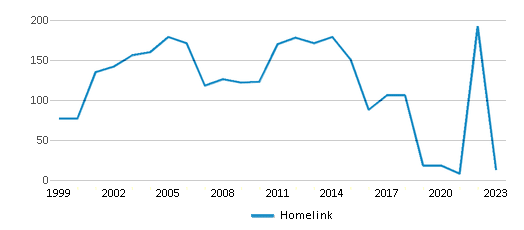
Gender %
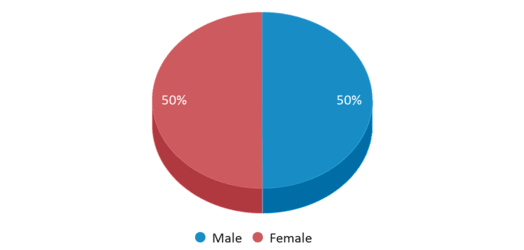
Total Classroom Teachers
2 teachers
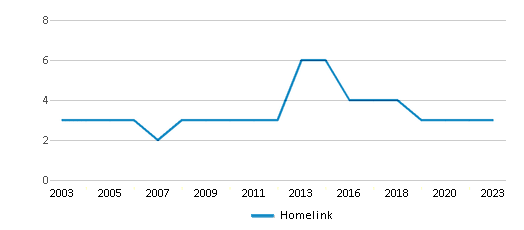
Students by Grade
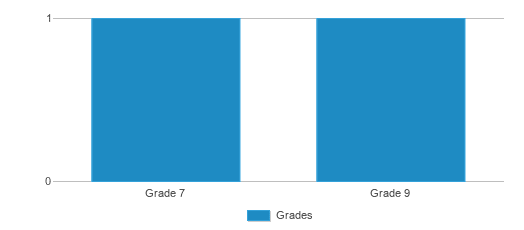
School Rankings
Homelink ranks within the top 20% of all 2,113 schools in Washington (based off of combined math and reading proficiency testing data).
The diversity score of Homelink is 0.51, which is less than the diversity score at state average of 0.69. The school's diversity has stayed relatively flat over five school years.
Overall Testing Rank
#368 out of 2113 schools
(Top 20%)
(Top 20%)
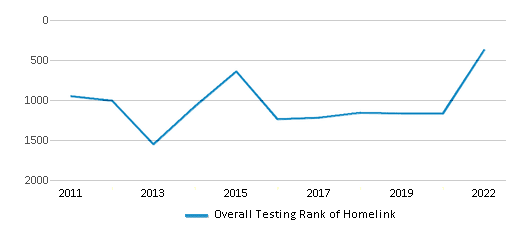
Math Test Scores (% Proficient)
55-59%
40%
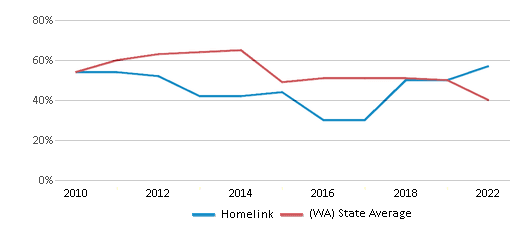
Reading/Language Arts Test Scores (% Proficient)
65-69%
53%
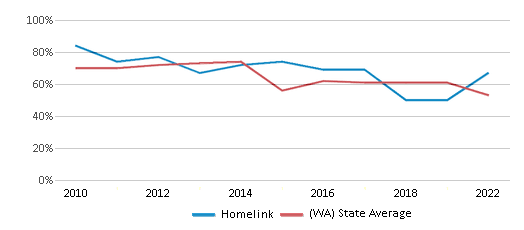
Science Test Scores (% Proficient)
≥80%
49%
Student : Teacher Ratio
1:1
16:1
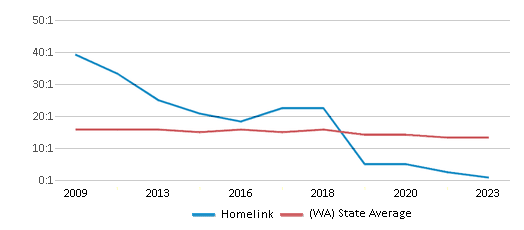
American Indian
n/a
1%
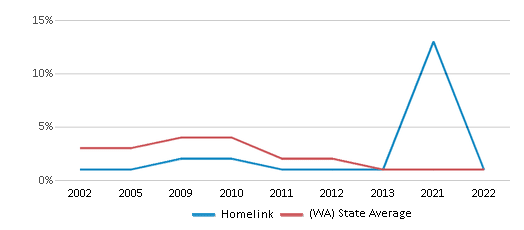
Asian
n/a
9%
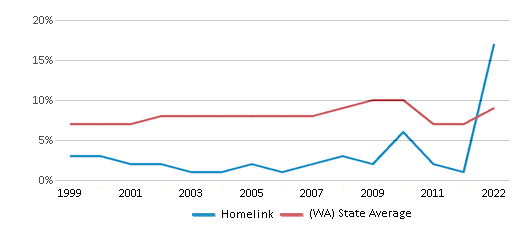
Hispanic
n/a
26%
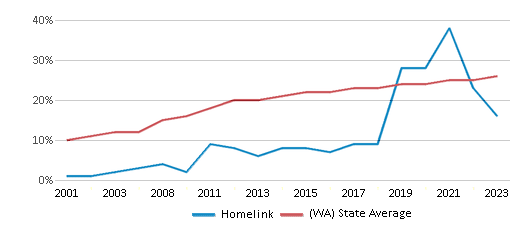
Black
n/a
5%
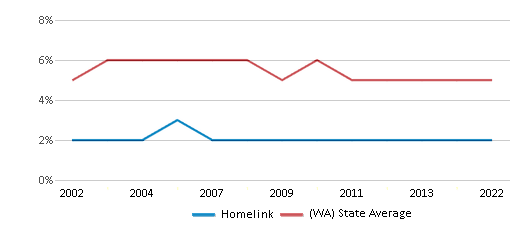
White
50%
48%
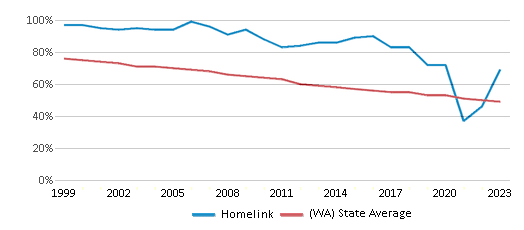
Hawaiian
n/a
2%
Two or more races
50%
9%
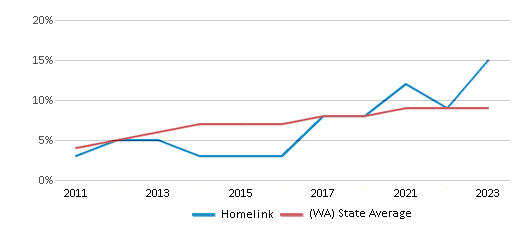
All Ethnic Groups
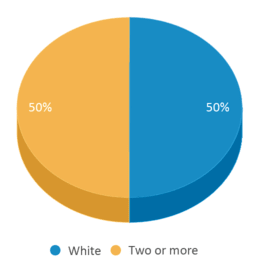
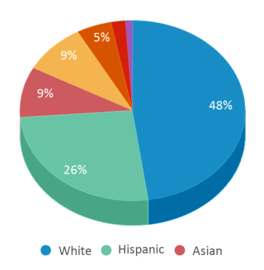
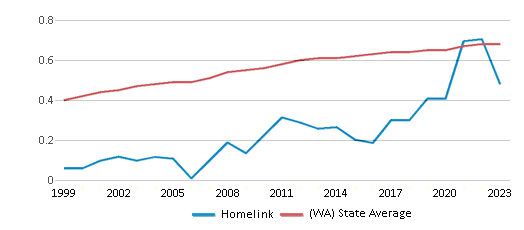
Graduation Rate
(15-16)≥50%
81%
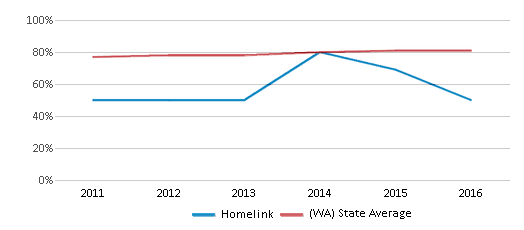
Eligible for Free Lunch
100%
49%
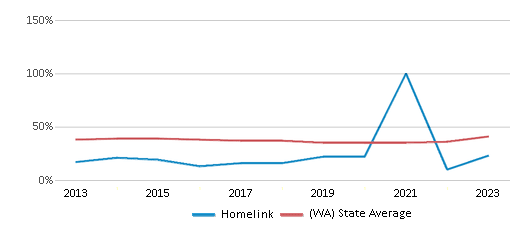
Eligible for Reduced Lunch
50%
n/a
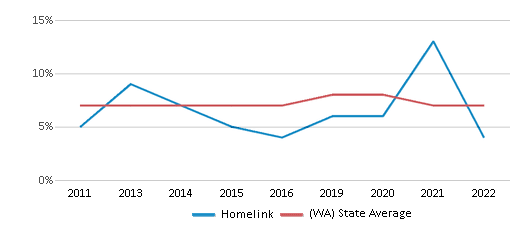
School Statewide Testing
School District Name
Source: National Center for Education Statistics (NCES), WA Dept. of Education
Profile last updated: 02/09/2025
Frequently Asked Questions
What is Homelink's ranking?
Homelink is ranked #368 out of 2,113 schools, which ranks it among the top 20% of public schools in Washington.
What percent of students have achieved state testing proficiency in math and reading?
55-59% of students have achieved math proficiency (compared to the 40% WA state average), while 65-69% of students have achieved reading proficiency (compared to the 53% WA state average).
What is the graduation rate of Homelink?
The graduation rate of Homelink is 50%, which is lower than the Washington state average of 81%.
How many students attend Homelink?
2 students attend Homelink.
What is the racial composition of the student body?
50% of Homelink students are White, and 50% of students are Two or more races.
What is the student:teacher ratio of Homelink?
Homelink has a student ration of 1:1, which is lower than the Washington state average of 16:1.
What grades does Homelink offer ?
Homelink offers enrollment in grades Kindergarten-12 (offers virtual instruction).
What school district is Homelink part of?
Homelink is part of Lake Stevens School District.
School Reviews
2 9/26/2007
Home Link School is extremely unorganized. The new administration seems to think that a school can still run with all the good teachers gone, and a one person office staff who is completely overwhelmed. Students are leaving this schoold due to new lower quality teachers coming in and an uptight highly political administration.The extra activities they offer are now being cut and they can no longer compete with a highly rated private high school. It is going down hill fast.The only thing still holding it together is the parent involvement and they too are frustrated and removing their children.Do you child a favor and put them in a REAL school. The education they get will be better and you will not have to worry about whether their credits will transfer- We learned the hard way that this school is hooky and my son lost half of his credits when he transferred out. Come to find out my son was one of many that lost credits- the school actually had to pull a video tape for a child who was in drama because they said there was no documentation he was in the class. WOW messed up.
Review Homelink. Reviews should be a few sentences in length. Please include any comments on:
- Quality of academic programs, teachers, and facilities
- Availability of music, art, sports and other extracurricular activities
Recent Articles

What Is A Charter School?
Explore the world of charter schools in this comprehensive guide. Learn about their history, how they operate, and the pros and cons of this educational innovation. Discover key facts about charter schools, including admission policies, demographics, and funding, as well as what to look for when considering a charter school for your child.

10 Reasons Why High School Sports Benefit Students
Discover the 10 compelling reasons why high school sports are beneficial for students. This comprehensive article explores how athletics enhance academic performance, foster personal growth, and develop crucial life skills. From improved fitness and time management to leadership development and community representation, learn why participating in high school sports can be a game-changer for students' overall success and well-being.

February 05, 2025
Understanding the U.S. Department of Education: Structure, Impact, and EvolutionWe explore how the Department of Education shapes American education, from its cabinet-level leadership to its impact on millions of students, written for general audiences seeking clarity on this vital institution.





